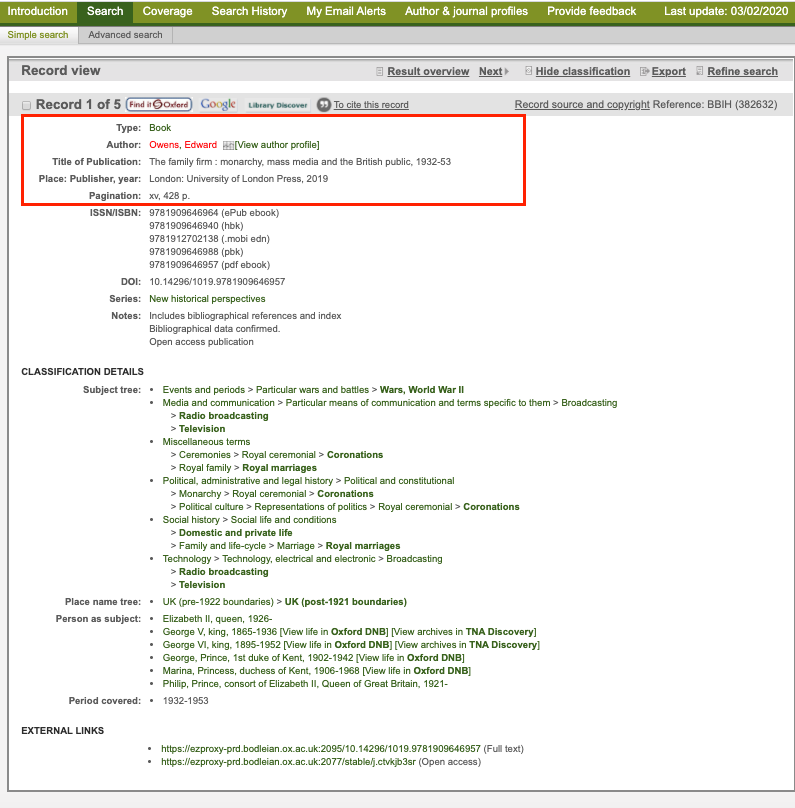By Simon Baker
The Bibliography of British and Irish History (BBIH) is a record of nearly 620,000 books, articles and essays relating to the British and Irish past and the British world. BBIH is updated three times a year, with the next release in early June.
Our latest update will add records of over 4000 titles, many for works published in 2019-20. Each BBIH update involves numerous stages and hands to ensure the Bibliography remains the richest and most-up-to-date record of British history publishing.
Here , the Bibliography’s Editor, Simon Baker recognises the effort and expertise behind the June 2020 update.
The latest update to the Bibliography of British and Irish History will be published very soon. In spite of Covid-19 and the lockdown we have managed to produce an update. The Bibliography is very much a team effort and has been even more so during lockdown and the pandemic. So we would like to thank all those who have contributed to the latest update.
First off, we’ve the Bibliography’s publisher, Brepols. They are based in Belgium and went into lockdown before the UK. However, they managed to get all their staff to work from home just before the start of remote working. This meant that the servers, access to the database and collating of bibliographic information continued. We would especially like to thank Chris, Jan and Wim.
Then, we have the BBIH Section Editors — all research historians in UK and European universities — who check the many thousands of references we send out to them. In spite of all libraries closing, the editors managed to return a majority of the references to be included in the June update. The advent of DOIs and links to full text have certainly made this stage in the editorial process a little easier in the recent past. However, not everything is available online and some checking will still need to be done once the libraries reopen. We’re also grateful to all the publishers who’ve recently created more Open Access material which has allowed the checking of more of the Bibliography’s underlying data.
And speaking of libraries, our thanks go to the British Library and its British National Bibliography and its Electronic Table of Contents (Etoc) service. While there has been recent disruption to both, we are sure they will be back to full flow as soon as practicable. The British Library has also helpfully created a guide to searching for Open Access material for researchers.
Thanks also to the staff of the IHR library who suggested alternative access to journals as well as the staff of the University of London’s Senate House Library and the increased provision of online resources.
A number of volunteers also help the Bibliography, including Peter Salt and Keith Manley, without their help the Bibliography would be less rich. We would also like to thank the regular contributors to the “feedback” links and their suggestions and additions
Often overlooked is the computer department of universities, in this case the University of London Computer Centre, which managed, at very short notice, to set up laptops for BBIH editors (and many other members of staff). This meant we could quickly move our work from the IHR’s premises in late March and to continue from home while still having full access to core data and other essential online resources.
We’d also like to thank the IHR and the Royal Historical Society for their continued support (moral and financial) and their confidence in the Bibliography.

Collating, preparing and publishing the data for each Bibliography update is very much a team effort: one that draws on a wide range of support. Compiling the core material — followed by its checking, editing and indexing by expert and highly skilled staff — brings with it the costs of a unique and specialist resource. Servers that store and serve up the data require regular maintenance and upgrade; data gathering carries monthly charges to our third-party providers, while specialist staff and office space bring additional costs.
It’s for these reasons that BBIH — like most other specialist, curated research databases — is a subscription service taken up by hundreds of institutions worldwide for their students and staff. So this is also a thank you to the libraries (and individuals) that subscribe to BBIH. Ours is a complex, multi-dimensional research project but it’s also one that’s run in the leanest and most efficient way possible. Without these subscriptions, the Bibliography certainty could not maintain its present reputation as the gold-standard for British and Irish history publishing, from the early 1900s to the present day.
Again thanks to all the above and we hope you find the June 2020 update — produced in such exceptional circumstances — useful for teaching and research.
About the Bibliography of British and Irish History

The Bibliography of British and Irish History (BBIH) is the largest and most comprehensive guide available to what’s been written about British and Irish history, from the early 1900s to 2020.
It’s an essential resource for research and teaching, providing up-to-date information (and links) to more than 620,000 History books, articles, chapters, edited collections and theses.
New records are added in three annual updates. These records are searchable by a wide range of facets including: title, author, chronology, date and form of publication, historical topic and geographical region.
The Bibliography is a research project of the UK’s Institute of Historical Research and the Royal Historical Society, and is published by Brepols. BBIH is a subscription service and is available remotely via university and research libraries worldwide.

